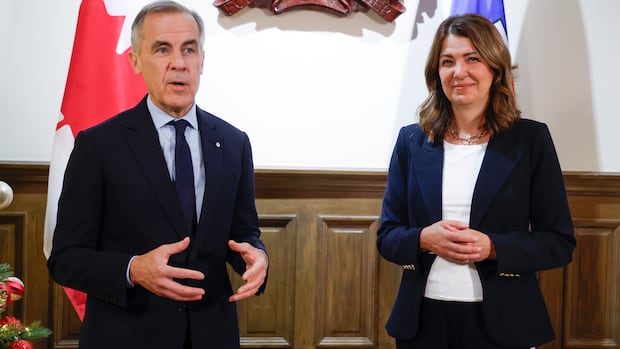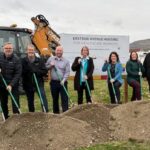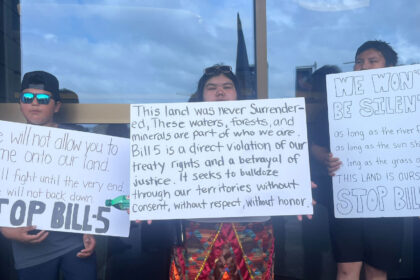Calgary·AnalysisThe Alberta premier’s dream of building a new pipeline to northwest B.C. has come incrementally closer to becoming a reality. But finding someone in the private sector to build it remains a hurdle — and Ottawa has some conditions of its own.Private company willing to build new oil pipeline to B.C. coast remains project’s missing puzzle pieceListen to this articleEstimated 6 minutesThe audio version of this article is generated by text-to-speech, a technology based on artificial intelligence.Prime Minister Mark Carney with Alberta Premier Danielle Smith in Calgary on Thursday. The two politicians signed an MOU that could clear the way for a new pipeline to the B.C. coast, though plenty of hurdles remain for the project. (Jeff McIntosh/The Canadian Press)Wanted: a private company ready to commit billions of dollars to build a major oil pipeline.The prime minister himself says he is on the lookout and even quipped on Thursday to a Calgary business crowd, “If you know of one in the room, come see us afterwards.”Mark Carney was delivering a speech when he made the offhand comment, following a series of events in the city after joining Alberta Premier Danielle Smith in signing a preliminary deal to pursue a new oil export pipeline from Alberta to the North Coast of British Columbia.The agreement also calls for developing nuclear power, pursuing AI data centres and supporting a multi-billion-dollar carbon-capture project, among other details.For its part, the federal government is providing exceptions to many environmental policies such as the B.C. tanker ban and the oilpatch emissions cap. That’s why the spotlight is now on Smith to see if she can actually get her pipeline idea off the ground. She campaigned for Carney to ditch several environmental policies and while he didn’t outright scrap them, he did enough to put the ball in her court to see if a new pipeline can be developed and built.So far, a few hurdles have been overcome on a long and complicated road ahead.Carney on stage with Calgary Chamber of Commerce president Deborah Yedlin at an event in Calgary on Thursday. (Jeff McIntosh/The Canadian Press)Standing ovations for PMSpeaking to a packed crowd of energy executives, Carney was greeted at the Calgary Chamber of Commerce with multiple standing ovations. It’s a scene that would’ve been hard to picture a year ago, when his predecessor Justin Trudeau was sinking in the polls and locked in a battle with Smith over environmental laws. WATCH | Carney’s warm reception in heart of the oilpatch:Carney gets a standing ovation in Calgary after signing energy MOUPrime Minister Mark Carney and Alberta Premier Danielle Smith signed an energy deal to pave the way for a new West Coast pipeline. Shortly after, he got a standing ovation when speaking to business leaders at a Calgary Chamber of Commerce event.Times have certainly changed. If anyone in the crowd had been asked a year ago if there was any chance of Alberta’s premier convincing the prime minister to soften major environmental laws as part of deal to pave the way for a new pipeline, “none of us would have taken that bet,” said Deborah Yedlin, president of the Calgary Chamber of Commerce. Last month, Smith unveiled plans for the Alberta government to develop and submit a formal application to the federal major projects office for an oil pipeline. Helping the government is a “technical advisory group” that includes three major pipeline companies — Enbridge, South Bow and Trans Mountain — although those companies would not necessarily be involved if the project were to proceed.So, who wants to build?That’s the main hurdle facing a new pipeline west: the lack of a private-sector proponent willing to step up and build the thing. Right now, the potential pipeline has no route and no name (though the Alberta government plans to help with some of that). Even with the help of the Major Projects Office, the project would have to make its way through the regulatory process and various consultations. Plus, it bears repeating: even with the support of Ottawa, the desire for a new pipeline isn’t exactly universal.Randy Ollenberger with BMO Capital Markets says pipeline companies will need to consider the cost of a new route west, especially given the huge overruns of the Trans Mountain expansion. (Paula Duhatschek/CBC)All of that could be daunting for any company planning to embark on the years-long process of building a new pipeline.Cost is another major hurdle. Companies are likely still haunted by the Trans Mountain Pipeline Expansion project, whose costs ballooned from an estimated $7.3 billion to more than $34 billion by the time all was said and done.“I don’t think any private sponsor is going to be prepared to just have a blank cheque associated with this project,” said Randy Ollenberger, managing director with BMO Capital Markets in Calgary.Pipeline companies might even want some sort of financial commitment from either Alberta or Ottawa to backstop any cost overruns outside a company’s control before they agree to put their name on a project, he said. “I’m going to take the prime minister at his word. This is a bold move,” said Mark Scholz, president of the Canadian Association of Energy Contractors, in an interview with CBC News.“I think you’re going to find proponents interested in moving forward,” he said.Trading one major project for anotherIn order for a new oil pipeline to be built, Ottawa does have some requirements — notably, the Pathways project.The Pathways Alliance is a consortium of oilsands companies that have pledged to reach net zero. The centerpiece of their plan is a project that would capture emissions from 20 oilsands facilities in northern Alberta and move them 400 kilometres by pipeline to a terminal near Cold Lake, Alta., where they would be stored underground. The companies behind the project haven’t yet made a final investment decision, but experts believe the language in the MOU around carbon pricing should be enough to push the project toward the starting line. “It gets it very close, if not over the line,” said Michael Bernstein, CEO of the climate think-tank Clean Prosperity. He said the MOU should provide assurances to businesses about the long-term future of carbon pricing, in order to make projects like Pathways worth the investment. But Pathways is its own major project that comes with its own set of hurdles. That could include opposition from Indigenous communities. Cold Lake First Nations Chief Kelsey Jacko said his community is ‘cautious’ about the prospect of carbon capture and storage and the potential risks the technology poses. (Paula Duhatschek/CBC)For years, Chief Kelsey Jacko of Cold Lake First Nations has been raising safety concerns about the project and told CBC this week there are still many questions left unanswered. “It’s frustrating when people are having talks and we’re absent from the table,” said Jacko. “At the end of the day, I just want my people to be safe.”Former Liberal MP and oilsands executive Martha Hall Findlay worked on the Pathways project for several years and is now convinced a private company will step up to build Alberta’s proposed pipeline.“There’s way too much money involved for that not to happen,” she said, pointing to how the federal government is providing the comfort a pipeline company would need to take on such a project.ABOUT THE AUTHORBorn and raised in Calgary, Paula Duhatschek is a CBC Calgary reporter with a focus on business. She previously ran a CBC pop-up bureau in Canmore, Alta., and worked for CBC News in Toronto, Kitchener and in London, Ont. You can reach her at paula.duhatschek@cbc.ca.with files from The Canadian Press
Danielle Smiths pipeline to northern B.C. clears another hurdle. Now, who will build it?











